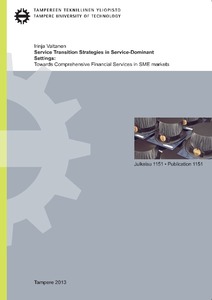A Contextual Business Model Framework: Business Model Development in a Product-Service Systems Context
Luoma, Ossi (2014)
Luoma, Ossi
2014
Yrityksen johtaminen - Management and Organization
Johtamiskorkeakoulu - School of Management
This publication is copyrighted. You may download, display and print it for Your own personal use. Commercial use is prohibited.
Hyväksymispäivämäärä
2014-10-24
Julkaisun pysyvä osoite on
https://urn.fi/URN:NBN:fi:uta-201410272257
https://urn.fi/URN:NBN:fi:uta-201410272257
Tiivistelmä
Tutkielman julkisuutta on rajattu 1.9.2017 asti.
The PDF is a limited version of the Master's thesis. The complete text will be available on the first of September 2017.
Increasingly, manufacturing-oriented companies are moving towards services provision with an accelerating pace, setting new requirements for their business models. This study addresses business model development in service business context, concentrating on transformation from products towards services. The study aims to find out which kinds of special needs does the service business create for business model development and, finally, to develop a business model framework that takes these needs into account better than the existing frameworks.
Business model discussion and the wide field of the service business theory provide the theoretical background for the study. Service-dominant logic is a comprehensive perspective towards the value creation whereas product-service systems and servitization address transformation of a production-oriented company towards service business. In the transformation towards services, organizational and cultural issues are also in an important role.
The study is based on an empirical case study concentrating on service-based business model design in a single case company setting. The case company is a manufacturing firm transitioning towards increasing services provision and developing a new business model for services in one of its subsidiaries. The study identifies the development needs in the case company’s current business model as well as the limitations in the existing frameworks used for business model development.
As a conclusion, the notions identified are used as a base for constructing a new business model framework. The findings, including the identified limitations, are reflected with the previous service business discussion. Finally, according to the issues identified, a new business model framework is developed in order to answer to the specific needs the transitioning towards service business sets for the framework. The key findings emphasize the importance of taking into account the context in business model development.
The PDF is a limited version of the Master's thesis. The complete text will be available on the first of September 2017.
Increasingly, manufacturing-oriented companies are moving towards services provision with an accelerating pace, setting new requirements for their business models. This study addresses business model development in service business context, concentrating on transformation from products towards services. The study aims to find out which kinds of special needs does the service business create for business model development and, finally, to develop a business model framework that takes these needs into account better than the existing frameworks.
Business model discussion and the wide field of the service business theory provide the theoretical background for the study. Service-dominant logic is a comprehensive perspective towards the value creation whereas product-service systems and servitization address transformation of a production-oriented company towards service business. In the transformation towards services, organizational and cultural issues are also in an important role.
The study is based on an empirical case study concentrating on service-based business model design in a single case company setting. The case company is a manufacturing firm transitioning towards increasing services provision and developing a new business model for services in one of its subsidiaries. The study identifies the development needs in the case company’s current business model as well as the limitations in the existing frameworks used for business model development.
As a conclusion, the notions identified are used as a base for constructing a new business model framework. The findings, including the identified limitations, are reflected with the previous service business discussion. Finally, according to the issues identified, a new business model framework is developed in order to answer to the specific needs the transitioning towards service business sets for the framework. The key findings emphasize the importance of taking into account the context in business model development.
Kokoelmat
Samankaltainen aineisto
Näytetään aineisto, joilla on samankaltaisia nimekkeitä, tekijöitä tai asiasanoja.
-
Service Transition Strategies in Service-Dominant Settings: Towards Comprehensive Financial Services in SME Markets
Valtanen, Irinja
Tampere University of Technology. Publication : 1151 (Tampere University of Technology, 2013)
ArtikkeliväitöskirjaIn recent years, firms across markets and industries have sought to grow beyond their traditional core business by developing ancillary service offerings and value-added solutions. However, in practice, knowledge on the ... -
IT Service Management System Implementation: Case Analysis in IT Service Provider Company
Salo, Vesa (2020)
DiplomityöIT Service Provider companies are working in business environment where changes are inevitable to survive. Changes happen in the markets and it makes the companies trying to keep up with the speed of change. One of the ... -
Service Acceptance Criteria for Releasing a Critical Service
KAMUNEN, ANNA (2013)
Pro gradu -tutkielmaAn IT Service is an information system run on a supported environment that meets specific quality requirements. Service management, an integrated process approach enables the controlled delivery of live services that satisfy ...



